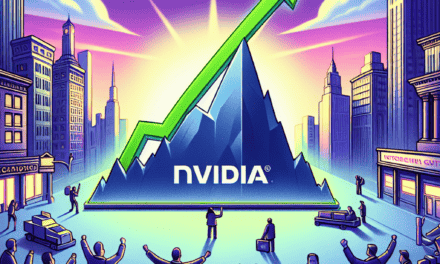“Embrace the Unexpected: Jensen Huang on Turning Interruptions into Innovation.”
Introduction
Jensen Huang, the visionary CEO of Nvidia, has long been recognized for his innovative leadership in the tech industry. In a recent discussion, Huang shared his insights on the unconventional yet powerful strategy of embracing interruptions as a pathway to success. He emphasized that interruptions, often seen as obstacles, can serve as catalysts for creativity and innovation when approached with the right mindset. By welcoming these unexpected challenges, Huang believes that individuals and organizations can unlock new opportunities, adapt more swiftly to change, and ultimately drive forward groundbreaking advancements. His perspective offers a fresh take on navigating the fast-paced and ever-evolving landscape of technology, highlighting the importance of flexibility and resilience in achieving long-term success.
Embracing Interruptions: Jensen Huang’s Secret to Success
In the fast-paced world of technology, where innovation is the key to staying ahead, Nvidia CEO Jensen Huang has carved a niche for himself by embracing a rather unconventional approach to success: welcoming interruptions. While many leaders strive for uninterrupted focus and seamless execution, Huang believes that interruptions can be a catalyst for creativity and innovation. This perspective, though seemingly counterintuitive, has played a significant role in Nvidia’s rise as a leader in the tech industry.
Huang’s philosophy is rooted in the idea that interruptions, rather than being mere distractions, can serve as opportunities for reflection and reassessment. In a rapidly evolving field like technology, the ability to adapt and pivot is crucial. Interruptions, whether they come in the form of unexpected challenges or new information, force individuals and organizations to pause and reconsider their strategies. This pause, according to Huang, is where the magic happens. It is during these moments of disruption that new ideas can emerge, leading to breakthroughs that might not have been possible in a linear, uninterrupted workflow.
Moreover, Huang emphasizes the importance of maintaining a flexible mindset. In his view, being open to interruptions requires a willingness to let go of rigid plans and embrace uncertainty. This flexibility allows for a more dynamic approach to problem-solving, where solutions are not confined to pre-existing frameworks. By encouraging his team to welcome interruptions, Huang fosters an environment where creativity can flourish. This approach has been instrumental in Nvidia’s ability to innovate and stay ahead of the curve in a highly competitive industry.
Furthermore, Huang’s embrace of interruptions extends beyond the internal workings of Nvidia. He recognizes that the tech landscape is constantly shifting, with new players and technologies emerging at a rapid pace. By staying attuned to these external interruptions, Nvidia can anticipate changes and adapt its strategies accordingly. This proactive approach ensures that the company remains at the forefront of technological advancements, rather than being caught off guard by unforeseen developments.
In addition to fostering innovation, embracing interruptions can also lead to more effective communication within an organization. Huang believes that interruptions provide opportunities for dialogue and collaboration, as they often require input from multiple perspectives. By encouraging open communication and valuing diverse viewpoints, Nvidia can harness the collective intelligence of its team to tackle complex challenges. This collaborative approach not only enhances problem-solving capabilities but also strengthens the overall cohesion of the organization.
While the idea of embracing interruptions may seem daunting to some, Huang’s success at Nvidia serves as a testament to the power of this approach. By viewing interruptions as opportunities rather than obstacles, he has cultivated a culture of innovation and adaptability that has propelled Nvidia to new heights. As the tech industry continues to evolve, Huang’s philosophy offers valuable insights for leaders seeking to navigate the complexities of a rapidly changing world.
In conclusion, Jensen Huang’s belief in the potential of interruptions to drive success challenges conventional wisdom and offers a fresh perspective on leadership and innovation. By embracing interruptions, both internal and external, Nvidia has been able to maintain its competitive edge and continue pushing the boundaries of what is possible in technology. As other leaders take note of Huang’s approach, the notion of interruptions as a pathway to success may well become a guiding principle for future innovation.
How Nvidia’s CEO Turns Interruptions into Opportunities
In the fast-paced world of technology, where innovation is the key to staying ahead, Nvidia’s CEO Jensen Huang has carved a niche for himself by embracing a rather unconventional approach to leadership: welcoming interruptions. In a recent discussion, Huang shared his insights on how interruptions, often seen as obstacles, can be transformed into opportunities for growth and success. This perspective is particularly relevant in an industry characterized by rapid change and constant evolution.
Huang’s philosophy is rooted in the belief that interruptions are not merely distractions but are, in fact, signals of change. By paying attention to these signals, leaders can identify emerging trends and potential disruptions in the market. This proactive approach allows companies to pivot and adapt, ensuring they remain competitive. For Nvidia, a company at the forefront of graphics processing and artificial intelligence, this mindset has been instrumental in maintaining its leadership position.
Moreover, Huang emphasizes the importance of being open to new ideas and perspectives that interruptions often bring. In a corporate environment, interruptions can come in various forms, such as unexpected feedback from employees, sudden shifts in consumer preferences, or unforeseen technological advancements. By fostering a culture that encourages open dialogue and values diverse viewpoints, Nvidia has been able to harness these interruptions to drive innovation. This inclusive approach not only enhances creativity but also empowers employees to contribute meaningfully to the company’s success.
Transitioning from theory to practice, Huang illustrates how Nvidia has successfully turned interruptions into opportunities. One notable example is the company’s strategic shift towards artificial intelligence and machine learning. Initially, Nvidia was primarily known for its graphics processing units (GPUs) used in gaming. However, recognizing the potential of GPUs in accelerating AI computations, the company embraced this interruption in its traditional business model. This strategic pivot has since positioned Nvidia as a leader in AI technology, opening up new markets and revenue streams.
Furthermore, Huang’s approach to interruptions extends beyond business strategy to encompass personal leadership style. He advocates for leaders to remain adaptable and resilient in the face of unexpected challenges. By viewing interruptions as opportunities for personal growth, leaders can develop the skills necessary to navigate complex situations and make informed decisions. This mindset not only enhances individual leadership capabilities but also sets a positive example for the entire organization.
In addition to fostering adaptability, embracing interruptions can also lead to improved problem-solving skills. When faced with an interruption, leaders are often required to think on their feet and devise creative solutions. This process of critical thinking and rapid decision-making can lead to innovative outcomes that might not have been possible in a more controlled environment. For Nvidia, this has meant staying ahead of competitors by continuously pushing the boundaries of what is possible in technology.
In conclusion, Jensen Huang’s perspective on interruptions offers valuable lessons for leaders across industries. By viewing interruptions as opportunities rather than obstacles, companies can remain agile and responsive in an ever-changing landscape. Nvidia’s success story serves as a testament to the power of this approach, demonstrating that embracing interruptions can lead to groundbreaking innovations and sustained growth. As the business world continues to evolve, leaders who adopt this mindset will be well-equipped to navigate the challenges and opportunities that lie ahead.
The Power of Adaptability: Lessons from Jensen Huang
In the rapidly evolving landscape of technology, adaptability has emerged as a crucial trait for success. Jensen Huang, the CEO of Nvidia, exemplifies this quality through his leadership and innovative vision. Huang’s perspective on embracing interruptions as a pathway to success offers valuable insights into the power of adaptability in the tech industry. As the driving force behind Nvidia’s transformation from a graphics card manufacturer to a leader in artificial intelligence and high-performance computing, Huang’s journey underscores the importance of flexibility and openness to change.
Huang’s philosophy is rooted in the belief that interruptions, often perceived as obstacles, can be catalysts for innovation. He argues that the ability to pivot in response to unexpected challenges is essential for growth. This mindset has been instrumental in Nvidia’s success, particularly in its strategic shift towards AI and data centers. By viewing interruptions as opportunities rather than setbacks, Huang has fostered a culture of resilience and creativity within Nvidia, encouraging his team to explore new possibilities and push the boundaries of technology.
Moreover, Huang’s approach to adaptability is not limited to technological advancements but extends to organizational dynamics as well. He emphasizes the importance of fostering an environment where diverse ideas can flourish. By embracing a wide range of perspectives, Nvidia has been able to navigate complex challenges and seize emerging opportunities. This inclusive approach has not only driven innovation but also strengthened the company’s position in a competitive market.
Transitioning from a focus on graphics processing units to AI and machine learning, Nvidia has demonstrated the power of adaptability in action. This strategic pivot was not without its challenges, but Huang’s willingness to embrace change and take calculated risks has paid off significantly. Under his leadership, Nvidia has become a key player in the AI revolution, providing the computational power necessary for advancements in autonomous vehicles, healthcare, and more. This success story highlights the importance of being open to new directions and the potential rewards of venturing into uncharted territories.
Furthermore, Huang’s insights into adaptability extend beyond the corporate sphere. He advocates for a mindset that values continuous learning and personal growth. In a world where technological advancements occur at an unprecedented pace, staying relevant requires individuals to be proactive in updating their skills and knowledge. Huang’s emphasis on lifelong learning resonates with professionals across industries, encouraging them to embrace change as an opportunity for self-improvement and career advancement.
In addition to fostering adaptability within Nvidia, Huang’s leadership style serves as a model for other organizations seeking to thrive in a dynamic environment. By prioritizing flexibility and encouraging a culture of innovation, companies can better position themselves to respond to disruptions and capitalize on new trends. Huang’s success story illustrates that adaptability is not merely a reactive measure but a proactive strategy that can drive sustained growth and success.
In conclusion, Jensen Huang’s perspective on embracing interruptions as a pathway to success offers valuable lessons in adaptability. His leadership at Nvidia demonstrates the transformative power of viewing challenges as opportunities and underscores the importance of fostering a culture of innovation and inclusivity. As the tech industry continues to evolve, Huang’s insights serve as a guiding light for organizations and individuals alike, highlighting the potential for growth and success through adaptability.
Jensen Huang’s Strategy: Why Interruptions Are Key to Innovation

In the fast-paced world of technology, where innovation is the key to staying ahead, Nvidia CEO Jensen Huang has carved a niche for himself by embracing a rather unconventional strategy: welcoming interruptions. While many leaders strive to minimize disruptions to maintain focus and efficiency, Huang believes that interruptions can be a catalyst for creativity and innovation. This perspective is rooted in his understanding of the dynamic nature of the tech industry, where change is the only constant and adaptability is crucial for success.
Huang’s approach to interruptions is not about allowing chaos to reign but rather about recognizing the potential that lies within unexpected disruptions. He argues that interruptions can serve as opportunities to reassess priorities, explore new ideas, and challenge existing assumptions. By being open to these moments, individuals and organizations can foster a culture of innovation that is responsive to the ever-evolving demands of the market. This mindset is particularly relevant in the context of Nvidia, a company that has consistently pushed the boundaries of what is possible in graphics processing and artificial intelligence.
Moreover, Huang’s strategy is deeply intertwined with the concept of serendipity, the occurrence of events by chance in a beneficial way. He posits that by allowing interruptions, one creates an environment where serendipitous discoveries are more likely to occur. This is especially important in research and development, where breakthroughs often happen when least expected. By encouraging his team to embrace interruptions, Huang fosters an atmosphere where creativity can flourish, leading to innovative solutions that might not have been conceived in a more rigid, interruption-free environment.
In addition to fostering innovation, embracing interruptions can also enhance problem-solving skills. When faced with an unexpected challenge, individuals are forced to think on their feet and devise creative solutions. This process not only sharpens critical thinking but also builds resilience, a quality that is invaluable in the face of adversity. Huang’s leadership style, which encourages his team to view interruptions as opportunities rather than obstacles, has been instrumental in Nvidia’s ability to navigate the complexities of the tech industry and maintain its competitive edge.
Furthermore, Huang’s perspective on interruptions aligns with the broader trend of agile methodologies in business. Agile practices emphasize flexibility, collaboration, and responsiveness to change, principles that are inherently compatible with the idea of embracing interruptions. By integrating these principles into Nvidia’s corporate culture, Huang ensures that the company remains agile and adaptable, ready to seize new opportunities as they arise.
In conclusion, Jensen Huang’s strategy of embracing interruptions is a testament to his visionary leadership and understanding of the tech industry’s intricacies. By viewing interruptions as opportunities for innovation and growth, Huang has cultivated a culture at Nvidia that thrives on creativity and adaptability. This approach not only positions the company for continued success but also serves as a valuable lesson for leaders across industries. In a world where change is inevitable, those who can harness the power of interruptions will be better equipped to drive innovation and achieve lasting success.
Navigating Disruptions: Insights from Nvidia’s Visionary Leader
In the rapidly evolving landscape of technology, disruptions are often seen as obstacles to be overcome. However, Jensen Huang, the CEO of Nvidia, offers a compelling perspective on why embracing interruptions can be a catalyst for success. Under his leadership, Nvidia has transformed from a graphics processing unit (GPU) manufacturer into a powerhouse of artificial intelligence and high-performance computing. Huang’s insights into navigating disruptions provide valuable lessons for businesses and leaders striving to thrive in an unpredictable world.
Huang’s philosophy is rooted in the belief that interruptions are not merely hindrances but opportunities for innovation and growth. He argues that the key to success lies in the ability to adapt and respond to these disruptions with agility and creativity. This mindset has been instrumental in Nvidia’s journey, particularly as the company ventured beyond its traditional markets. By viewing interruptions as a chance to explore new possibilities, Nvidia has been able to pivot and expand its influence across various industries, including automotive, healthcare, and data centers.
One of the pivotal moments in Nvidia’s history was the realization that its GPU technology could be leveraged for more than just gaming. This insight came during a period of disruption when the demand for high-performance computing was on the rise. Instead of resisting this shift, Huang embraced it, recognizing the potential for GPUs to accelerate complex computations in fields such as artificial intelligence and machine learning. This strategic pivot not only diversified Nvidia’s product offerings but also positioned the company as a leader in AI technology.
Moreover, Huang emphasizes the importance of fostering a culture that encourages experimentation and risk-taking. In his view, organizations that are open to interruptions are more likely to innovate and stay ahead of the curve. By creating an environment where employees feel empowered to explore new ideas and challenge the status quo, Nvidia has cultivated a workforce that thrives on disruption. This culture of innovation has been a driving force behind the company’s ability to consistently deliver cutting-edge solutions and maintain its competitive edge.
In addition to internal culture, Huang highlights the significance of external collaboration in navigating disruptions. He believes that partnerships with other industry leaders, academic institutions, and research organizations can provide fresh perspectives and insights that drive innovation. Nvidia’s collaborations with companies like Tesla and research institutions have not only expanded its technological capabilities but also reinforced its position as a pioneer in AI and computing.
Furthermore, Huang underscores the necessity of maintaining a long-term vision while being responsive to immediate challenges. He advises leaders to balance short-term adaptability with a clear strategic direction, ensuring that their organizations remain resilient in the face of disruptions. This approach has enabled Nvidia to weather various industry shifts and emerge stronger, as evidenced by its continued growth and success.
In conclusion, Jensen Huang’s perspective on embracing interruptions offers a valuable framework for navigating the complexities of today’s business environment. By viewing disruptions as opportunities for innovation, fostering a culture of experimentation, and leveraging external collaborations, organizations can not only survive but thrive amidst change. As Nvidia’s journey demonstrates, the ability to adapt and evolve in response to interruptions is a hallmark of successful leadership and a key driver of long-term success.
Success Through Flexibility: Jensen Huang’s Approach to Leadership
In the ever-evolving landscape of technology, adaptability and flexibility have become crucial components of success. Nvidia CEO Jensen Huang, a visionary leader in the semiconductor industry, has long championed the idea that embracing interruptions can lead to remarkable achievements. His approach to leadership, which emphasizes the importance of flexibility, offers valuable insights into navigating the complexities of modern business environments.
Jensen Huang’s leadership philosophy is rooted in the belief that interruptions, often perceived as obstacles, can be transformed into opportunities for innovation and growth. This perspective is particularly relevant in the fast-paced world of technology, where rapid advancements and unexpected challenges are the norm. By viewing interruptions as catalysts for change rather than hindrances, Huang encourages his team to remain agile and open-minded, fostering a culture of continuous learning and adaptation.
One of the key aspects of Huang’s approach is his emphasis on the importance of being receptive to new ideas and perspectives. In a field where technological breakthroughs can redefine entire industries, staying attuned to emerging trends and disruptive innovations is essential. Huang advocates for a leadership style that is not only responsive to change but also proactive in seeking out new opportunities. This mindset enables Nvidia to remain at the forefront of the semiconductor industry, consistently pushing the boundaries of what is possible.
Moreover, Huang’s commitment to flexibility extends beyond his approach to technology and innovation. He recognizes that effective leadership requires a deep understanding of the diverse needs and aspirations of his team. By fostering an inclusive and collaborative work environment, Huang ensures that all voices are heard and valued. This inclusivity not only enhances team cohesion but also drives creativity and problem-solving, as diverse perspectives often lead to more comprehensive and innovative solutions.
In addition to promoting flexibility within his team, Huang also emphasizes the importance of personal adaptability. He believes that leaders must be willing to step outside their comfort zones and embrace uncertainty. This willingness to take risks and explore uncharted territories is a hallmark of successful leadership. By setting an example of courage and resilience, Huang inspires his team to approach challenges with confidence and determination.
Furthermore, Huang’s approach to leadership is characterized by a strong focus on long-term vision and strategic planning. While embracing interruptions and adapting to change are crucial, Huang also understands the importance of maintaining a clear sense of direction. By balancing flexibility with a well-defined strategic framework, he ensures that Nvidia remains aligned with its overarching goals while navigating the complexities of the technology landscape.
In conclusion, Jensen Huang’s approach to leadership, which emphasizes the value of embracing interruptions and fostering flexibility, offers a compelling blueprint for success in today’s dynamic business environment. By viewing interruptions as opportunities for growth and innovation, Huang encourages his team to remain agile and open-minded. His commitment to inclusivity, personal adaptability, and strategic vision further underscores the importance of flexibility in achieving long-term success. As the technology industry continues to evolve, Huang’s leadership philosophy serves as a powerful reminder of the transformative potential of embracing change and disruption.
Transforming Challenges into Triumphs: Nvidia CEO’s Perspective
In the fast-paced world of technology, where innovation is the key to staying ahead, Nvidia CEO Jensen Huang has carved a niche for himself by embracing a philosophy that many might find counterintuitive: the acceptance and even encouragement of interruptions. This approach, according to Huang, is not merely a strategy for managing the unexpected but a fundamental aspect of fostering creativity and driving success. By understanding how interruptions can be transformed into opportunities, Huang offers a unique perspective on leadership and innovation.
Huang’s journey with Nvidia, a company he co-founded in 1993, is a testament to the power of adaptability and resilience. Over the years, Nvidia has evolved from a graphics card manufacturer to a leader in artificial intelligence and high-performance computing. This transformation did not occur in a vacuum; it was the result of navigating numerous challenges and disruptions. Huang believes that interruptions, whether they come in the form of technological shifts, market changes, or unexpected obstacles, are not merely hurdles to overcome but catalysts for growth and innovation.
One of the key insights Huang shares is the importance of maintaining an open mindset. In a rapidly changing industry, clinging to rigid plans can be detrimental. Instead, Huang advocates for a flexible approach that allows for the incorporation of new ideas and the adaptation to unforeseen circumstances. This mindset encourages teams to view interruptions not as setbacks but as opportunities to reassess and realign their goals. By fostering an environment where creativity can flourish, Nvidia has been able to pivot and innovate in ways that have kept it at the forefront of the tech industry.
Moreover, Huang emphasizes the role of collaboration in transforming challenges into triumphs. Interruptions often necessitate a reevaluation of strategies, and this process can benefit greatly from diverse perspectives. By encouraging open communication and collaboration across teams, Nvidia has been able to harness the collective intelligence of its workforce. This collaborative spirit not only helps in finding solutions to immediate problems but also in anticipating future trends and disruptions. As a result, Nvidia has been able to stay ahead of the curve, consistently delivering cutting-edge products and solutions.
In addition to fostering creativity and collaboration, Huang highlights the importance of resilience in the face of interruptions. The ability to remain steadfast and focused, even when plans are derailed, is crucial for long-term success. Huang’s leadership style is characterized by a calm and composed demeanor, which instills confidence in his team and encourages them to persevere through challenges. This resilience is not about ignoring the difficulties but about confronting them with a strategic mindset and a willingness to adapt.
Furthermore, Huang’s perspective on interruptions extends beyond the confines of Nvidia. He believes that this approach can be applied to various aspects of life and business. By embracing interruptions, individuals and organizations can develop a more dynamic and responsive approach to problem-solving. This adaptability is increasingly important in a world where change is the only constant.
In conclusion, Jensen Huang’s philosophy of embracing interruptions as a pathway to success offers valuable lessons for leaders and innovators across industries. By maintaining an open mindset, fostering collaboration, and cultivating resilience, Nvidia has transformed challenges into opportunities for growth and innovation. Huang’s insights serve as a reminder that in the face of disruption, the ability to adapt and evolve is the true measure of success.
Q&A
1. **Question:** What is Jensen Huang’s position at Nvidia?
**Answer:** Jensen Huang is the CEO of Nvidia.
2. **Question:** What key concept does Jensen Huang emphasize for achieving success?
**Answer:** Jensen Huang emphasizes the importance of embracing interruptions.
3. **Question:** How does Jensen Huang view interruptions in the context of work?
**Answer:** Jensen Huang views interruptions as opportunities for innovation and adaptation.
4. **Question:** What is one benefit of embracing interruptions, according to Jensen Huang?
**Answer:** Embracing interruptions can lead to creative problem-solving and new ideas.
5. **Question:** How does Jensen Huang suggest handling interruptions?
**Answer:** Jensen Huang suggests being open-minded and flexible when dealing with interruptions.
6. **Question:** What impact do interruptions have on team dynamics, according to Jensen Huang?
**Answer:** Interruptions can foster collaboration and enhance team dynamics by encouraging diverse input.
7. **Question:** Why does Jensen Huang believe interruptions are inevitable in the tech industry?
**Answer:** Interruptions are inevitable due to the fast-paced and ever-changing nature of the tech industry.
Conclusion
Jensen Huang, CEO of Nvidia, emphasizes that embracing interruptions can lead to success by fostering adaptability, encouraging innovation, and enhancing problem-solving skills. By viewing interruptions as opportunities rather than obstacles, individuals and organizations can remain agile, respond effectively to changing circumstances, and drive continuous improvement. This mindset allows for the exploration of new ideas and the ability to pivot strategies, ultimately contributing to long-term success and resilience in a rapidly evolving technological landscape.




